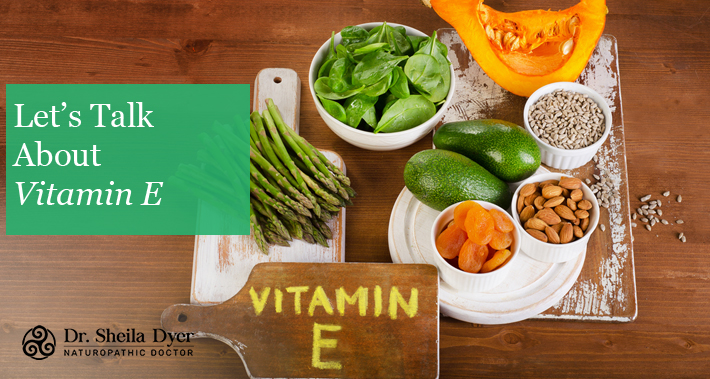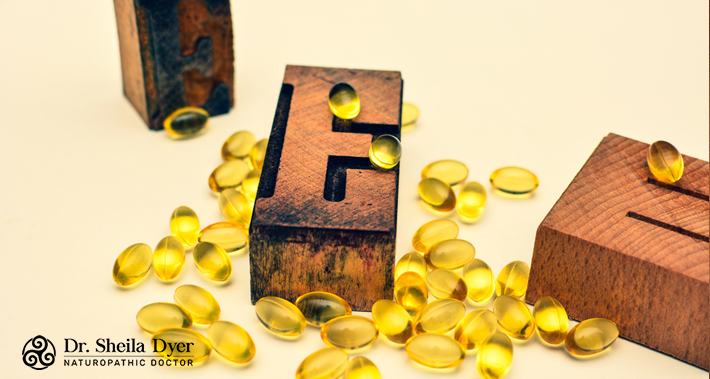Everyone knows in order to stay healthy you need to ensure you’re getting “all of your vitamins”.
However beyond this advice, most people don’t know what the role of each vitamin is in the body, or the best way to ensure you’re getting enough.
I’m Dr. Sheila Dyer, a naturopathic doctor in Toronto, and I want to help de-mystify some facts around vitamins for you.
Today we’re going to put the spotlight on vitamin E – its benefits, sources, and what can happen if you get too much.
Keep reading to learn more.
What Is Vitamin E?
Vitamin E is a fat-soluble vitamin with antioxidant and anti-inflammatory properties.
Being fat-soluble means it can be stored in the body and released as needed, unlike water-soluble vitamins where the excess is generally excreted through urine.
In addition, vitamin E is an essential nutrient, meaning the body can’t create it on its own – it needs to be taken in through supplementation or in the food you eat.
Health Benefits Of Vitamin E
Getting enough vitamin E is important to your overall health.
Let’s have a look at some of the benefits it has for your body.
1. It’s A Potent Antioxidant
Vitamin E is an antioxidant, which means it helps prevent oxidation and protect against free radicals which can damage cells.
Free radicals can play some important roles, for example, they can help fight infection.
However, if the balance of free radicals and antioxidants tips too far in favour of free radicals they can also cause damage.
Antioxidants such as vitamin E have a role to play in managing levels of free radicals and preventing them from causing harm.
Other common antioxidants include:
- vitamin C
- Melatonin
- Beta-carotene, which your body converts into vitamin A
- Copper
- Polyphenols
- Zinc
- Etc.
2. It Helps Protect Your Cells
Vitamin E can help protect cells by slowing the rate at which they age.
Oxidation due to free radicals can cause cells to break down fast than they otherwise would, so the antioxidants in vitamin E can help to protect, and prolong, the life of your cells.
3. It May Help Prevent Atherosclerosis
Atherosclerosis is the buildup of fats and cholesterol in your arteries.
It can lead to heart attacks and stroke if not properly managed.
A study in the Journal of Nutrition showed supplementation with vitamin E may be linked to a reduced risk of developing atherosclerosis.
4. It May Have Anti-Cancer Properties
A number of studies have looked into the effect vitamin E may have on the development of cancer.
One meta-analysis found vitamin E supplementation to be linked to a reduction in the incidence of prostate cancer.
Additionally, vitamin E has been found to reduce the risk of neurotoxicity associated with chemotherapy and radiation treatments for cancer.
5. It Can Help Lower Blood Pressure
High blood pressure, or hypertension, comes with a wide range of risks, including heart disease, kidney disease, heart attack, heart failure, and stroke.
A 2002 study in the International Journal for Vitamin and Nutrition Research found participants given vitamin E tablets saw significant decreases in blood pressure, compared to the placebo group.
The study concluded vitamin E supplementation could be effective for long term use in patients with mild hypertension.
If you’re struggling with high blood pressure, you may benefit from acupuncture as well – reach out to book an appointment and let’s see if acupuncture is right for you.
Dietary Sources Of Vitamin E
As previously mentioned, vitamin E cannot be created by the body – it needs to be taken in through the food you eat, or supplementation.
Some food which contain vitamin E include:
- Tomato
- Kiwifruit
- Mango
- Broccoli
- Boiled spinach
- Dry roasted sunflower seeds
- Dry roasted peanuts, almonds, and hazelnuts
What Is Vitamin E Toxicity?
Because vitamin E is stored by the body, it’s possible for too much of it to build up, resulting in complications.
Symptoms of vitamin E toxicity include:
- Nausea
- Digestive issues
- Abdominal cramping
- Headache
- Fatigue
It is difficult to overdose on vitamin E through dietary sources alone, however, if you are using supplements be sure to discuss this with your doctor or naturopath to ensure your levels don’t become too high.
Should You Take Vitamin E Supplements?
Most people will not require supplementation with vitamin E, although some take them in hopes of taking advantage of their antioxidant effects, decreasing cancer risk, or for its benefits to skin and hair.
Individuals with disorders which affect their digestion such as Crohn’s disease may be at risk of low vitamin E levels.
If this is the case for you, let’s talk about how you can choose an appropriate supplement.
Book An Appointment With Dr. Sheila
Are you worried you’re not getting enough vitamin E – or any other vitamin?
Do you have reasons you think you should be taking supplements, but want to ensure you’re doing so safely, and that they aren’t going to lead to vitamin E toxicity?
Are you looking for ways to increase your antioxidant intake?
I’m Dr. Sheila Dyer, ND, and I can help you determine which nutrients you need to get more of, and make diet and supplementation recommendations to ensure your body has everything it needs to function at its peak.
Contact me, Dr. Sheila Dyer, ND, today to book an appointment.
If you have questions about naturopathic medicine, or would like to start with your first consultation, contact me, and let’s book an appointment.
Dr. Sheila Dyer, ND1080 Dovercourt Rd,
Toronto, ON M6H 2X8
(416) 554-5135
► https://g.page/DrSheilaDyerNd
Dr. Sheila Dyer is a Naturopathic Doctor and a practicing registered nurse offering holistic healthcare with a scientific focus

